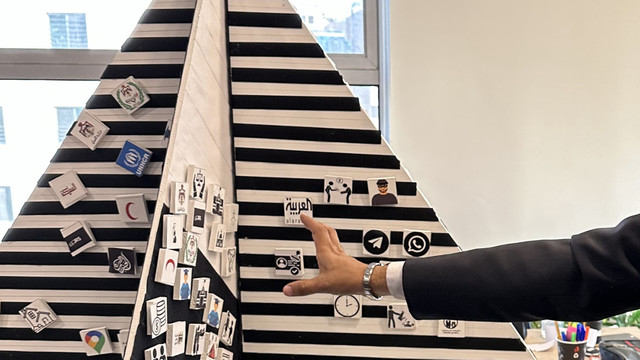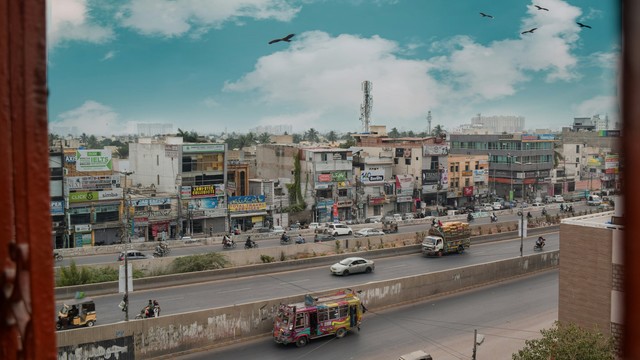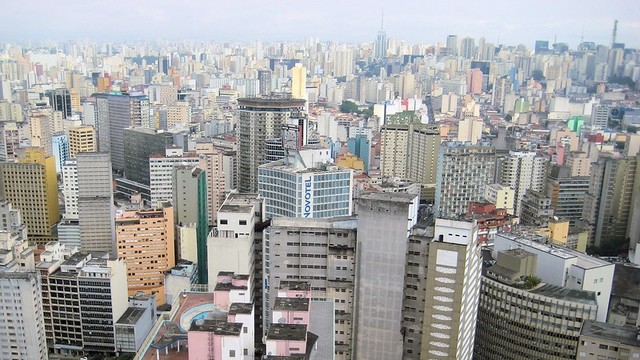Is this too easy?
Voices from grassroots communities are being heard at Habitat III, but will this make a difference where it counts? Diana Mitlin writes from Quito.


Bimbo Osobe and Samuel Akinrolabu, members of the Nigerian Slum/Informal Settlement Federation, lead a march of residents of Lagos waterfront communities threatened with eviction, to Governor Akinwunmi Ambode's office to demand open dialogue with the government on alternatives to evictions of the urban poor (Photo: Copyright Andrew Maki)
At the United Nations' Habitat III conference, it's clear that 'community voice' is even more fashionable than the new iPhone. And listening to speakers and participants, there is every indication that this is not just a passing interest but a declaration of intent to be backed up by resources.
One of the key grassroots networks is Shack/Slum Dwellers International (SDI). Their stall has been crowded with people coming to listen to experiences, pick up information and engage with disadvantaged citizens, and the 30-plus SDI members have a hectic schedule, speaking on panels and attending events.
SDI is far from being the only group involved. Another key grassroots network, WIEGO, is also busy as session organisers draw in the voices that they think will be valued by the UN conference participants.
Having an impact
I saw the impact of this when I moderated a panel for the UN Office of the High Representative for the Least Developed Countries, Landlocked Developing Countries and Small Island Developing States (UN-OHRLLS) to talk about "Harnessing the potential of urbanisation in LDCs".
Professional experts from the World Bank, OECD UN-OHRLLS and the UN Office for Project Services (UNOPS) were joined on the panel by Sarah Nandudu, a shack dweller from Jinja, a secondary city in Uganda. She explained how residents in informal settlements were able to work in partnership with their local government.
Her contribution was picked up in later comments by the other panellists, and what she said was warmly received. Sarah explained, for example, how organised community groups had shown the council how to reduce construction costs so that the money intended for two sanitation blocks funded five.
Sarah was warmly clapped and the first three of four audience questions were addressed to her. The other panellists were among the first to acknowledge what she contributed with her grassroots perspective.
But what can we draw from this? Having been exposed on many occasions to the ways in which grassroots community leaders are marginalised in their own localities, the ways in which their voices are silenced, the extent to which their needs are ignored, and having heard how discourse trivialises and criminalises their citizenship… I have to ask: "What difference will this make?".
There are three areas where this question is crucial.
Funding and investment
What difference will it make to funding processes and investment choices? And what differences will it make to control of funds?
Most development assistance and government development funds are managed by professionals according to professional logics. The sector specificities, the timeframes, the programme designs and anticipated outcomes are all set by professionals. When 'beneficiaries' are consulted, it is at the micro-level.
Will the increased recognition of the significance of community capabilities result in development finance shifting significantly to the organisations which represent low-income citizens? Will networks such as SDI and the Asian Coalition for Housing Rights be invited into the decision-making rooms of development assistance agencies?
And will substantial amounts of development assistance be redirected to projects planned in partnerships between organised urban citizens and their local authorities?
Evictions
What difference will it make to practices on the ground? In September 2015, approximately 10,200 residents were forcibly evicted from the Badia-East community in the Ijora area of Lagos, Nigeria. Many of them remain homeless, dependent on family and friends.
Days before Habitat III opened, the Governor of Lagos State threatened further evictions across waterfronts in Lagos. The proximity to global declarations makes this act particularly shocking.
But every day such evictions are repeated as governments and/or private sector companies seek to claim back well-located land. Sometimes the flood risks associated with low elevation settlements mean that resettlement is needed. But as an SDI member from Sierra Leone said in a session discussion: "Relocate where necessary, develop where possible".

Disturbingly, evictions from well-located settlements appear to be increasing as economic growth increases land values. The discourse of modern cities has little place for disadvantaged and low-income citizens, except as an invisible labour force, present at work but otherwise unseen.
Global recognition
And what difference will it make to global targets and priorities? The World Urban Campaign has made Rose Molokoane, deputy president of the SDI, their co-chair. The World Urban Campaign is a platform coordinated by UN-Habitat with 136 partners and networks.
Such a position demonstrates a genuine desire to acknowledge the central role of disadvantaged groups in developing solutions (at the global as well as the local level) that address their needs and interests.
It is also recognition that partnership needs to be addressed more seriously, including the voice of low-income and disadvantaged urban citizens, and bringing other key parties to the table, including local authorities. But all together this really does feel a bit too easy.
There appears to be little recognition of the structural disadvantages faced by such groups and specifically their lack of inclusion in governance within towns and cities both in the global South and North.
I am reminded of the many people living in informal settlements that I have met who constantly are ignored and under-appreciated with their citizenship unrecognised. People such as Rosemary Lungu and her savings group colleagues in Kitwe, Zambia, who had to return to the municipal offices each week for more than two years before the town clerk agreed to meet with them.
Will all these global priorities and positions change the realities for Rosemary and the other 900 million people living in informal settlements?
Diana Mitlin (diana.mitlin@iied.org) is principal researcher in IIED's Human Settlements research group.



